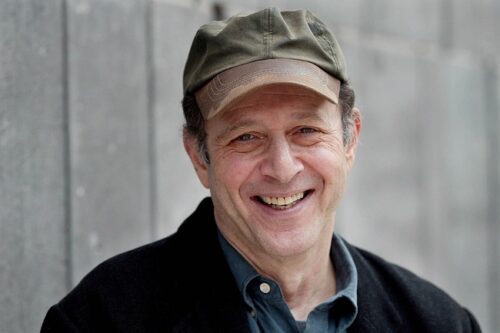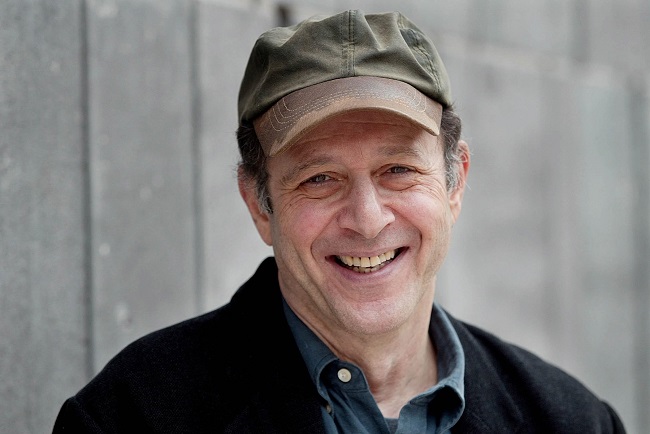 United States ‘A Steve Reich Celebration’: Colin Currie Group, Synergy Vocals. Presented by Cal Performances, Zellerbach Hall, University of California, Berkeley, 3.11.2022. (HS)
United States ‘A Steve Reich Celebration’: Colin Currie Group, Synergy Vocals. Presented by Cal Performances, Zellerbach Hall, University of California, Berkeley, 3.11.2022. (HS)

Steve Reich – Tehillim; Traveler’s Prayer; Music for 18 Musicians
Over the years, Steve Reich’s music has hewed closest to the original style of minimalism that he, Philip Glass and John Adams, the most prominent composers in that style, pioneered in the 1970s. All three have, of course, expanded their musical palates considerably since then, adding their own rich ideas to late-twentieth and twenty-first century classical music.
To my ears, Reich’s works have always focused most on rhythmic elements, symbolized by his still-delightful Clapping Music. That short piece from 1972 distilled his endless fascination with phased rhythms (shifting rhythmic phrases slightly against each other to reach complexity) into an entertaining rhythm-canon. Music for 18 Musicians, which debuted in 1976, exploded the idea. To the endless shifts in rhythm, Reich gradually expanded melodic gestures and clustered harmonies into an hour-long feast.
The sheer length and endless ostinatos can drive some listeners to distraction, of course, but in a wholehearted performance in Berkeley, the Colin Currie Group made the marathon into a prolonged, sinuous, sonorous dance.
Percussionist and conductor Currie, the instrumental ensemble and Synergy Vocals have long been proponents of Reich’s music. They’ve premiered a number of his recent works, most recently Traveler’s Prayer, the centerpiece of the program, which received its West Coast premiere at Zellerbach Hall Thursday.
Although the score for Music for 18 Musicians suggests a 55-minute running time, this performance spilled over to an hour and ten minutes. The variation stems from the structure, which relies on cues from the centrally placed metallophone (a vibraphone with no motor) to alert the rest of the band to move from one section to the next. The score asks the singers and clarinet players to hold their sustained notes for as long as their breaths can go before moving on to the next gesture.
There was, as a result, a feeling of improvisation to the performance, as the mallet instruments and maracas established an unchanging tempo. (This required occasional tag-team switches to reduce fatigue by the players.) Alternating with bass clarinets, a violin and a cello, two clarinets added more texture in both rhythm and tone. Four women singers contributed sustained pedal tones and chords.
These elements expanded and contracted over the course of the piece, creating a palpable sense of waves washing gently against the shore. At each shift, the gestures from the lead instruments started off with a few notes, extending the phrase as they repeated, bringing in more complexity and definition. Reich, like his contemporary minimalists today, wouldn’t let these elements go on for so long – his pieces tend to come in at about 30 minutes rather than an hour-plus. But the result of such a dedicated performance remains hypnotic and memorable.
Traveler’s Prayer debuted at the Concertgebouw in Amsterdam in 2021 and made its U.S. premiere at Carnegie Hall only last week. Although most of Reich’s work leans in on syncopated rhythms, Traveler’s Prayer shapes a harmony-forward thing of beauty. Dissonances abound, but they tend toward cluster chords on the diatonic scale rather than sharp-edged minor seconds, major sevenths and other chromatic clashes. At times it felt like an opulent jazz ballad, the soft edges of the orchestration (tuned mallet percussion, piano and strings) contributing to a sublime gentleness.
Most of all, Reich’s heartfelt setting of the Hebrew Tefilat Haderech (known in English as Traveler’s Prayer or Wayfarer’s Prayer) alludes to something more than a blessing before an earthly journey. The 86-year-old composer, in his program note, suggests that it could also apply to ‘travel from this world to the next’. The soft, steady tread of the tempo and the woven textures of the music’s polyphony seemed to underline that idea.
The first section is set to a traditional Ashkenazi Jewish melody on the verse from Exodus, ‘Behold, I send a messenger before you to protect you on the way and to bring you to the place that I have prepared’; and, from Genesis, ‘To Your lifeline I cling, Eternal, I cling Eternal, to Your lifeline, Eternal, to Your lifeline I cling’. The flavor was very different from the sort of floating vocal effects of Reich’s own melody for Psalm 121 to the words ‘The Eternal will guard your departure and your arrival from now till the end of time’.
The singers – leading with tenors Will Wright and Benedict Hymas – do recite the prayer in Hebrew, but without projected titles or a libretto in the program it was impossible to connect the musical phrasing with the thoughts. The general feeling, though, was one of quiet serenity and hope, the sustained harmonic richness bringing it home.
The contrast with the program’s other works was striking. Tehillim, which opened the concert, dates from 1981, at a point when Reich began to embrace his Jewish cultural roots. The big ensemble, bristling with the colors of woodwinds and brass against the sustained sounds of strings and the composer’s signature fascination with punchy rhythms articulated by mallet percussion, made a joyful paean of this exuberant piece.
One by one the singers – sopranos Carolyn Jaya-Ratnam, Micaela Haslam, Amanda Morrison and Rachel Weston and alto Heather Cairncross – wove their sound into the mix, their voices dancing against the complex, gradually shifting rhythms. With pinpoint intonation and articulation, each singer’s distinct vocal sound mixed seamlessly with the ensemble and with each other.
The words were from Psalms 18, 19, 34 and 150. Without titles or a libretto, the details were unclear, but the joyful sound against crisp percussion (clapping, small tambourines without jingles, small cymbals) was unmistakable. The final hallelujah produced big grins and enthusiasm from the audience.
Harvey Steiman
